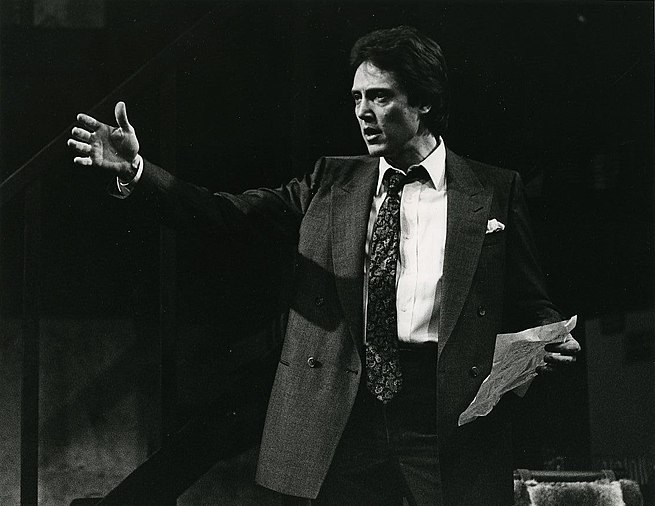-
Monologue
In theatre, a monologue (from Greek: μονόλογος, from μόνος mónos, “alone, solitary” and λόγος lógos, “speech”) is a speech presented by a single character, most often to express their mental thoughts aloud, though sometimes also to directly address another character or the audience. Monologues are common across the range of dramatic media (plays, films, etc.), as well as in non-dramatic media such as poetry. Monologues share much in common with several other literary devices including soliloquies, apostrophes, and aside. There are, however, distinctions between each of these devices.
-
Soliloquy
A soliloquy (from Latin solo “to oneself” + loquor “I talk”) is a device often used in drama when a character speaks to him- or herself, relating thoughts and feelings, thereby also sharing them with the audience, giving off the illusion of being a series of unspoken reflections. If other characters are present, they keep silent and/or are disregarded by the speaker. Though it should be said that sometimes, depending on the performance, a monologue that is written as a soliloquy, will be addressed directly to the audience. And sometimes it is hard to tell if what is being heard is a monologue, or a duologue or a soliloquy; in which case choosing the right term may be a matter of interpretation.
A soliloquy is a type of monologue, but it is not an aside: a monologue is a speech where one character addresses other characters, or the audience; or it is a speech that is self-directed; an aside is a (usually short) comment by one character towards the audience, though during the play it may seem like the character is addressing him or herself.
Soliloquies were frequently used in dramas but went out of fashion when drama shifted towards realism in the late 18th century. But nowadays, with budget restrictions in theatre, they have come back into fashion.
Good examples in literature can be seen in the words of the character of Iago, who has a leading role in Shakespeare’s famous play Othello.
Examples of a present form of soliloquy are found in the sitcom Lizzie McGuire and the political drama House of Cards.
-
Monologue (noun)
A long speech by one person in a play; sometimes a soliloquy; other times spoken to other characters.
-
Monologue (noun)
A long series of stories and jokes as an entertainment.
-
Monologue (noun)
A long, uninterrupted utterance that monopolizes a conversation.
-
Monologue (verb)
To deliver a monologue.
-
Soliloquy (noun)
The act of a character speaking to themselves so as to reveal their thoughts to the audience.
“At the end of the second act the main villain gave a soliloquy detailing his plans to attack the protagonist.”
-
Soliloquy (noun)
A speech or written discourse in this form.
-
Soliloquy (verb)
To issue a soliloquy.
-
Monologue (noun)
a long speech by one actor in a play or film, or as part of a theatrical or broadcast programme
“he was reciting some of the great monologues of Shakespeare”
“he had a long and exacting monologue at the end of the film”
-
Monologue (noun)
a long, tedious speech by one person during a conversation
“Fred carried on with his monologue as if I hadn’t spoken”
-
Soliloquy (noun)
an act of speaking one’s thoughts aloud when by oneself or regardless of any hearers, especially by a character in a play
“he did most of his thinking by soliloquy”
“Edmund ends the scene as he had begun it, with a soliloquy”
-
Soliloquy (noun)
a part of a play involving a soliloquy
“in the opening soliloquy he declares his true intent”

